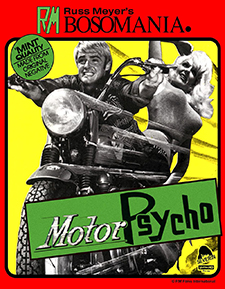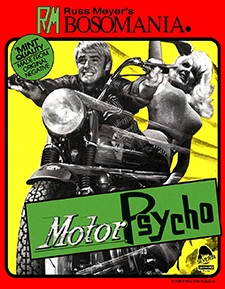Motorpsycho (4K UHD Review)

Director
Russ MeyerRelease Date(s)
1965 (April 29, 2025)Studio(s)
Eve Productions, Inc. (Severin Films)- Film/Program Grade: N/A
- Video Grade: A-
- Audio Grade: A-
- Extras Grade: C+
Review
The most notable aspect of Russ Meyer’s 1965 exploitation thriller Motorpsycho is that it’s a prelude to what’s considered by many to be one of his quintessential films, Faster, Pussycat! Kill! Kill!, which was released the following year.* Whereas Pussycat! became a renowned cult film after failing to make an initial theatrical profit, Motorpsycho was a hit when it opened. Even so, it unfortunately fell by the wayside and was overshadowed by the eventual popularity of Pussycat!. It’s also been difficult to see in good quality, which Severin Films, via the Museum of Modern Art, has rectified, as they have and will likely continue to do with other Russ Meyer films.
*(It’s worth pointing out that many online sources state that Faster, Pussycat! Kill! Kill! began screening around the same time as Motorpsycho, even prior to it in some cases. However, the earliest date that I can find for Pussycat! is March 2, 1966 at the Imperial Theatre in Long Beach, with Motorpsycho as the second feature. Motorpsycho actually began its initial run in the August to September 1965 timeframe.)
In Motorpsycho, a roaming motorcycle gang on their way to Las Vegas stop and make trouble for strangers along their route, especially for the women whom they viciously assault. One of their victims is the wife of Corey (Alex Rocco), a veterinarian who will stop at nothing to get his revenge. Joining him is Ruby (Haji), a married woman whose husband was recently killed by the same gang, narrowly surviving the attack herself. As her and Corey begin to bond while tracking down these outlaws across an unforgiving desert landscape, dissent within the gang starts to rear its head when its leader begins to have disturbing and psychotic Vietnam flashbacks. Also among the cast are Stephen Oliver, Joseph Cellini, Thomas Scott, and Coleman Francis.
Originally titled Rio Vengeance, Motorpsycho fits in snugly within the biker movie genre of the 1960s, next to films like The Born Losers, The Wild Angels, The Hellcats, and She-Devils on Wheels, among many others. All of them can be traced back to 1953’s The Wild One, directed by László Benedek and starring Marlon Brando. However, the biker movies of the 1960s had a “hippies and young people gone bad” bent to them, rather than Brando-esque misunderstood bad boy personas. The exploitation on display in Russ Meyer’s world is strong here, setting his sights on something more marketable after his stint in the “nudie-cutie” period, of which Doris Wishman is the best known purveyor. The resulting film is replete with genre tropes, beautiful women, rock music, and the type of sleaze that definitely doesn’t hold up 60 years later.
Motorpsycho can be shockingly and horribly misogynistic, blaming women for the assaults and blatantly stating that their bodies were specifically made to recover from them. It’s indefensible garbage dialogue as spoken by Russ Meyer himself who portrays a local sheriff, of which he may have been more than a little regretful (as he should have been). Thankfully, these moments don’t last long, just enough to keep you from shutting it off. For contrast, there’s a more playful moment later on in which Ruby must suck the venom out of Corey’s leg after he’s been bitten by a rattlesnake, which is completely over the top and clearly meant to remind you of something else, which is more Russ Meyer’s style. In truth, the first half or so of the film really is the toughest section to get through, but once the gang actually murders somebody and Corey and Ruby meet, it gets far more enticing. It’s also noted to have one of the earliest examples of a Vietnam War veteran going crazy and doing something horrendous, which unfortunately became not just an accepted, but an expected movie trope that was no help to veterans whatsoever.
The most interesting aspect of the film is the relationship between Corey and Ruby. Contrary to the commentary accompanying this disc, these characters never cross the anticipatory romantic or sexual line, and there’s no hint that they ever will. The story ends with them driving off together, having survived their hardship, but you get the idea that they’ll be going their separate ways. Corey will be returning to his wife and Ruby will be moving on to Los Angeles. It feels like one of those “in another time, in another place” situations, had either of them been single. It helps that Alex Rocco and Haji have some surprising chemistry, even if their characters end up having a mutual and platonic respect for each other. You quickly discern that Corey is one of the few men, if not the only man, that Ruby has ever met that wasn’t simply trying to get into her pants. Of course, that doesn’t excuse Corey’s previous behavior with one of his clients who kisses him passionately before he pulls away, citing his loyalty to his wife and that he was merely “curious.” Still, Corey and Ruby are survivors more than friends or lovers. I honestly don’t understand how anybody could read that relationship or the ending of the film any other way, but I digress.
Motorpsycho certainly has its moments, especially during its explosive finale, but many will prefer the higher highs of the Haji-starring follow-up. At 74 minutes, it moves pretty quickly, giving you a taste of what was to come for Russ Meyer, prior to his brief mainstream success as a director-for-hire at 20th Century Fox, and his completely gonzo and controversial sexploitation era.
Motorpsycho was shot by Russ Meyer on 35mm black-and-white film, finished photochemically, and presented in the aspect ratio of 1.66:1. Severin Films debuts the film on Ultra HD with a new 4K restoration of the original camera negative, with additional sections scanned from a 35mm interpositive, by the Museum of Modern Art. It’s also been graded for High Dynamic Range in HDR10, and encoded to a dual-layered BD-66 disc. It’s a gorgeous black-and-white presentation, with very few caveats. The day-for-night cinematography absolutely crushes black levels, which are built into the presentation. Otherwise, it’s an organic image with solid levels of grain and a bitrate that sits almost exclusively in the 90 to 100Mbps range. Everything is clean and stable, with the HDR enhancing shadow nuances but never overexposing the brighter parts of the image. Contrast is excellent from end to end. Opticals appear to be sourced from the aforementioned interpositive, but they blend well with footage from the original negative. In short, this puts any and all previous lower grade presentations of the film to complete and utter shame.
Audio is included in English 2.0 mono DTS-HD Master Audio with optional subtitles in English SDH. Aside from mild distortion built into the soundtrack by the heavy use of rock and roll music, the track is otherwise clean with only mild hiss during passages of dialogue. It’s limited by its age, but supports the various elements well, without any instances of sibilance, thumps, or crackle.
Severin Films’ 2-Disc 4K Ultra HD release of Motorpsycho sits in a black Amaray case alongside a Region-Free 1080p Blu-ray with an insert and a slipcover that features a portion of the original theatrical poster, but re-creating the original RM Films VHS and DVD artwork. This is also being released simultaneously in the US, Canada, and the UK, for those keeping score. The following extras are included on each disc:
DISC ONE (UHD)
- Audio Commentary with Elizabeth Purchell and Zach Clark
- Trailer (HD – 3:32)
DISC TWO (BD)
- Audio Commentary with Elizabeth Purchell and Zach Clark
- Desert Rats on Hondas (HD and Upscaled SD – 21:16)
- Trailer (HD – 3:32)
The new audio commentary features film historian Elizabeth Purchell and filmmaker Zach Clark. While it’s a knowledgeable and enthusiastic chat, it’s often frustrating at times because of Purchell’s incorrect reading of the film, with specific regards to the story, but also of other aspects of Russ Meyer’s career. Regardless, it’s still jam-packed and rarely stops for a breath. The better extra is Desert Rats on Hondas, which features vintage interviews with actors Haji and Alex Rocco. They discuss their beginnings, Haji reiterating the story of how she was a dancer that was asked to audition for Meyer, and Rocco discussing his troubled past and later becoming an actor. They go over working on location with Meyer and the other actors, being new to acting, realizing later what their director wanted without actually telling them, and giving their retrospective feelings on the film and working with Meyer. Last is the film’s trailer.
Severin Films has been slowly but surely releasing Russ Meyer’s catalogue on 4K Ultra HD with beautiful results, and Motorpsycho is no exception. It’s a lovely presentation of a film that’s had very little tender care on home video. For Russ Meyer fans, it’s definitely worth picking up.
- Tim Salmons
(You can follow Tim on social media at these links: Twitter, Facebook, BlueSky, and Letterboxd. And be sure to subscribe to his YouTube channel here.)

